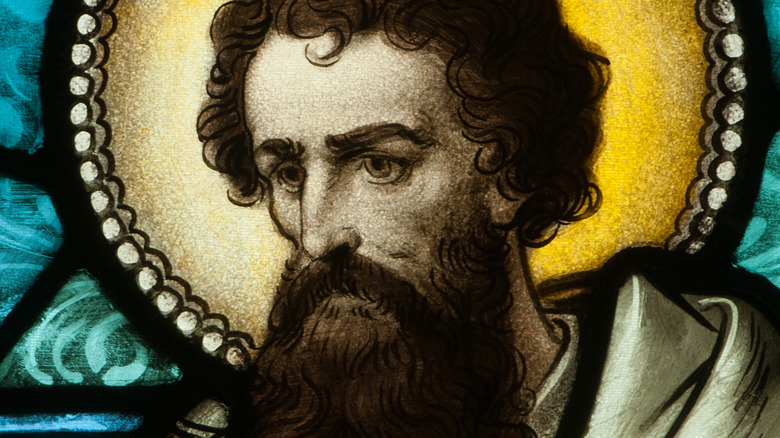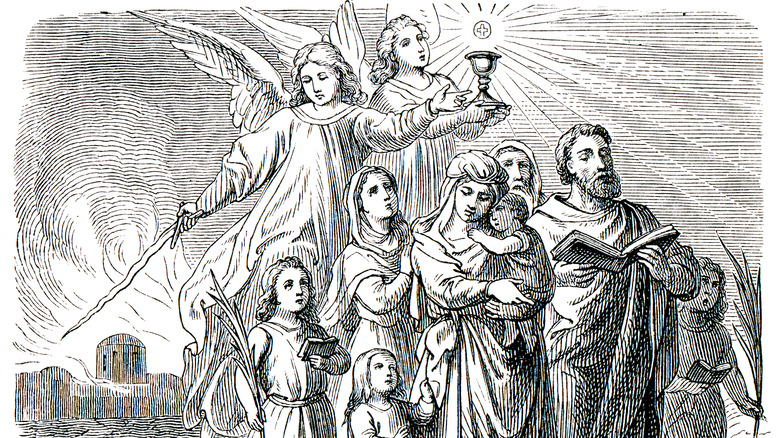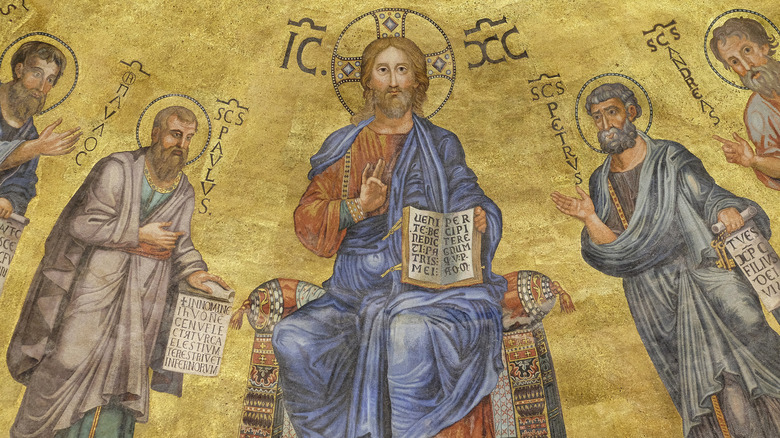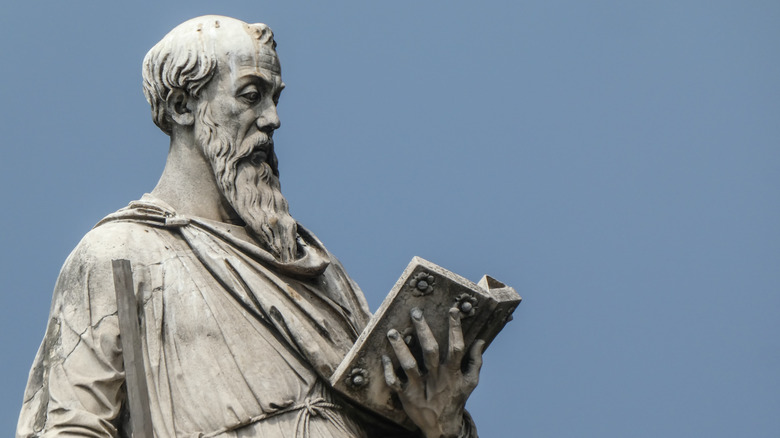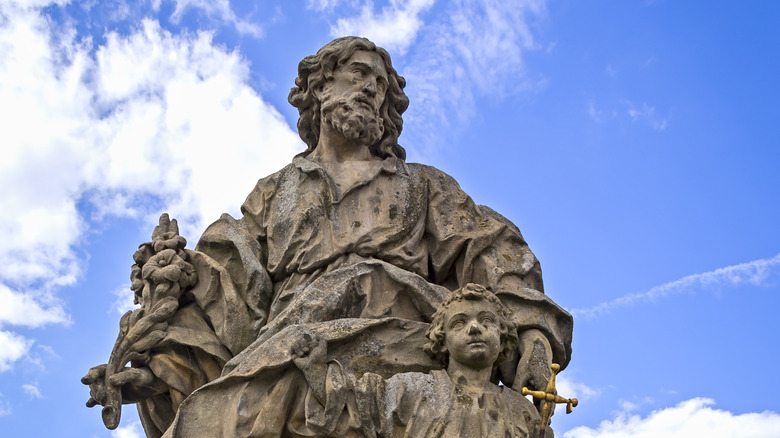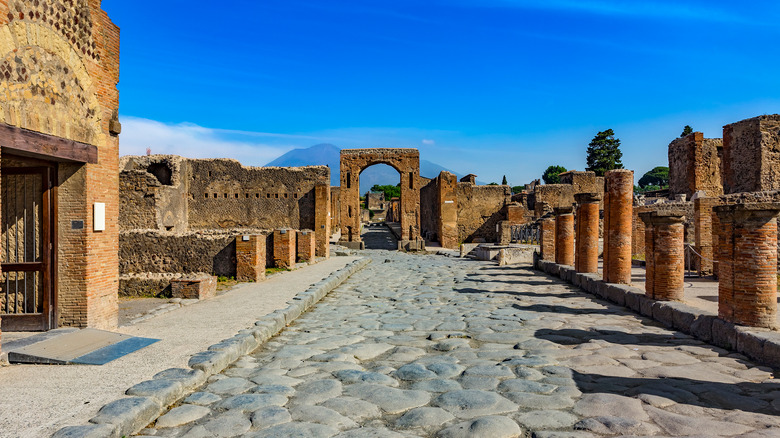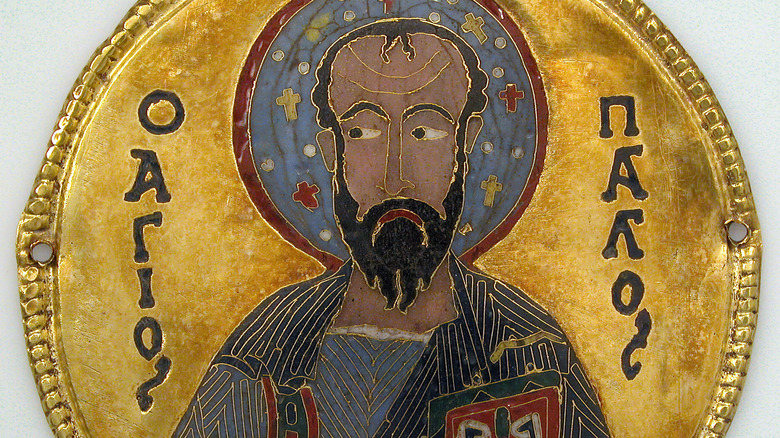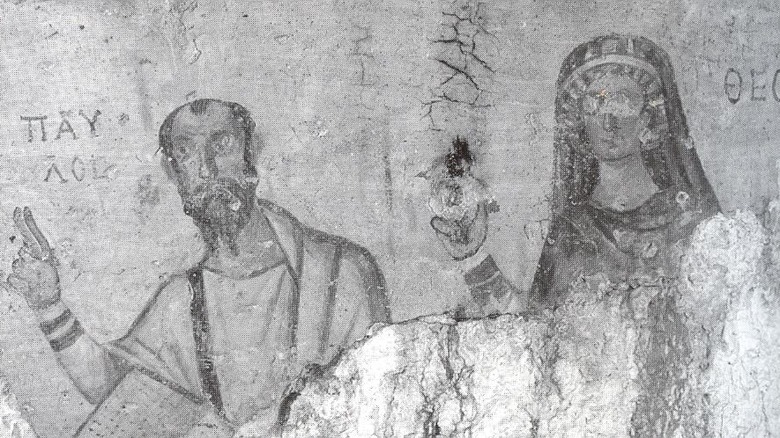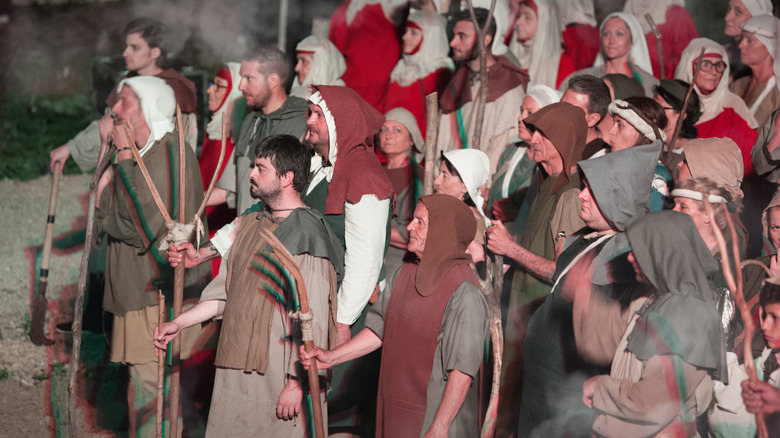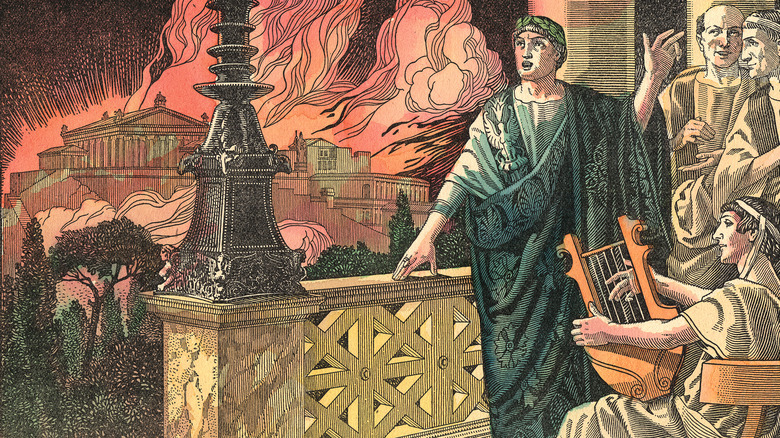The Untold Truth Of Paul From The Bible
In the New Testament, a fair amount of squabbling goes on between Jesus and the Pharisees, a first-century Jewish sect (via Britannica). So, it's surprising that one of the most significant Christian missionaries in history grew up as a Pharisee. We know him as the Apostle Paul. Born in Tarsus, Paul received a Pharisaical education in Jerusalem "at the feet of Gamaliel, [and] was taught according to the perfect manner of the law of the fathers" (Acts 22:3). This upbringing put him on a crash course with the followers of Jesus, who referred to themselves as "The Way," per Catholic Online.
Paul's traditional educational background explains the zealous persecution of the Christians Paul would undertake before his rise as a Christian leader. According to Reading Acts, "Paul was a Diaspora Jew who claimed to have been raised in a family which kept the Jewish traditions without fault. He was an ultra-conservative reacting to what he perceived as a dangerous liberal view (Jesus was the Messiah and the High Priest killed him!)"
Of course, things would change abruptly with Paul's vision on the Road to Damascus, as reported by Britannica. Stricken blind with a vision of Jesus, he could travel no further. After three days, a follower of Jesus by the name of Ananias restored Paul's sight, according to the Book of Acts, and Paul concluded that Jesus not only lived in heaven but was the Messiah and Son of God (via Bible Gateway).
He learned how to work with his hands
Despite being educated as a Pharisee, Paul also learned a trade, which served him throughout his life. According to 1 Corinthians 4:12, Paul mastered how to "work with [his] own hands" making tents (via Britannica). Carrying a simple bag of tools for working leather, he could travel practicing this trade throughout the Roman world, which would come in handy during his missionary work.
That said, establishing a traditional tent-making business with a steady clientele would've evaded Paul because he couldn't carry all the needed supplies on his many travels. What's more, establishing a storefront would've required staying in one geographic location for an extended period. He would've needed time to network with local guilds and city leaders.
According to The Gospel Coalition, rare instances did occur where he stayed in one place for a longer time. For example, while living in Corinth, an established business employed him. This business would've had all the necessary relationships with local leaders and guilds to maintain a steady clientele. Overall, though, while Paul and his workers might have done jobs for food and a place to sleep, they, like most travelers, would have mainly depended on patrons and the hospitality of others in general.
Early Christians saw Paul as a terrorist and with good reason
Before taking the name Paul, Saul of Tarsus terrorized early Christian communities, bent on exterminating believers, per the Colonial Presbyterian Church. The last person in the world anyone could foresee transforming into a follower of Jesus, his conversion represented a lesson in forgiveness. Naturally, some of Jesus' followers initially found Paul a tough pill to swallow.
After all, Paul oversaw some of the most egregious acts of violence against the early church. He likely participated in the trial of Stephen, who would go on to become the first Christian martyr, stoned to death in the streets of Jerusalem. (Paul also oversaw his execution.) He probably witnessed (and supported) the disciples John and Peter getting flogged. And he set himself with the task of exterminating the church in Damascus. There's no doubt that bad blood existed between Paul and The Way. Following his transformation, he would've needed to prove himself to the people he once persecuted.
According to Pastor Michael Miller, writing for the Times-Journal, "It was important that he spend some time with those he had come to imprison. They needed to see what God could do in a person's life. Saul needed to see those he was bent on arresting. He would see them from a different perspective. He would learn to live a life of faith in the Lord Jesus and spend his life promoting the gospel that he once terrorized." How old was Paul at the point of his transformation? Most scholars agree roughly 30 years old.
Paul retreated to Arabia before launching a ministry
Many people assume that Paul immediately dove into full-time ministry work after his conversion experience on the Road to Damascus. But a second look at Galatians tells a different story. Paul writes, "But I went away into Arabia, and returned again to Damascus" (via the University of Chicago). This phrase provides invaluable information about an important aspect of his life, and it also raises some fascinating questions.
For example, how long did Paul spend there, and what was the nature of his experience? The general consensus that Paul remained in Arabia for two to three years. His experience near Damascus had left him confused, and he needed time to reflect on what he'd seen in his vision. This interesting turn of events defies logic, which would have sent Paul to Jerusalem to study with the Apostles.
Instead, Paul claims to have received direct revelations from Jesus in Arabia. He also tells the Galatians that 14 years after his travels in Arabia, he had the chance to compare notes with the disciples in Jerusalem. To their astonishment, according to the New Testament, they proved on the same page. A Ligonier puts it, "There never [was] a problem ... between Paul's message and the teaching of the Jerusalem church."
Saul didn't take a new name
Paul first appears in the New Testament as Saul of Tarsus. But in Acts 13:9, Luke writes, "Then Saul, who was also called Paul..." (via Bible Gateway). Thereafter, he goes by Paul, which has led many readers to assume he underwent a name change. In reality, he decided to go by another of his given names. You see, Roman citizens received three names at birth, known as their tria nomina.
According to the Classical Resource Centre, "Roman citizens (male) had a complex system of names, which distinguished them from all other peoples of the ancient world, who mostly used a personal name with a patronymic." "Saul" represented Paul's Hebrew name, and "Paullus" or "Paul" his Latin one. Essentially, a Pharisee named Saul chose to be known as the Roman citizen called Paul. In other words, instead of taking on a completely new name, he chose to emphasize a different aspect of his identity.
Did the name change hold other significance? Scholars have considered the question without coming to a consensus. Some think he took the name as a "victory title" of sorts after bringing Sergius Paulus, a proconsul of Rome, into the fold. But many others disagree with this interpretation, including the National Catholic Register. What's their take on the name-swap matter? "A more plausible view is that Saul began using the name Paul because it was more familiar to the Gentile audience to which he was now ministering."
Paul never converted to Christianity
Despite joining the "tribe of the Christians" (as early believers were called by some Jews like the historian Josephus), Paul never converted to Christianity, per PBS. Throughout his life, Paul observed his Jewish faith and saw no contradictions in keeping Torah and spreading the Gospel message.
It's important to remember that Christianity as a separate religious sect didn't come into being until A.D. 325, as reported by Patheos. And despite the commonality of phrases such as "winning converts" in Christian-speak, Paul didn't convert anyone else, either. After all, conversion implies transitioning from one established group to another. Instead, the people Paul taught in Corinth and Thessalonika learned about an "innovation" in Judaism. Since he often disseminated the "good news" or "Gospel" to fellow Hebrews, they could adopt this innovation without changing religions.
So, why do so many people talk about conversion? According to Patheos, "our look at such 'conversions' is anachronistically psychological. It is also ethnocentric, presuming a similar experience to what happens when people today 'accept Jesus' and are 'saved.'" In other words, if we can't put ourselves into the mindset of first-century Jews, it's difficult to understand what the Gospel message meant to them.
Paul the Apostle definitely got around
Traveling is generally fairly easy today, but in ancient Rome, only so many options existed: boats, horses, carriages, and feet. That makes it even more amazing that Paul traveled roughly 10,000 miles, and he did much of it as a pedestrian, per Being a Disciple.
Walking didn't represent the biggest problem that Paul faced. In his letters to various churches published in the New Testament, he records the perils of life on the road. For example, he had to deal with robbers, persecutors of Christians, extreme temperatures, hunger, and exposure due to inadequate clothing. On the rare occasion he could hitch a ride on a boat, it didn't guarantee safe travels, according to Base Institute. After running afoul of the authorities, Paul ended up as a prisoner on a maritime transport, which crashed on the island of Malta. Definitely no party!
In addition to the physical hardships and sacrifice, Paul also spent a lot of money traveling the ancient world. As reported by Open Bible, the more one of Paul's treks was by ship, the more expensive it was, though Paul and those he traveled with might not have had to pay full price. Paul did have one thing on his side as a missionary — the Pax Romana (Roman Peace). This period, established during the reign of the Emperor Augustus, came with stability and peace, facilitating thousands of miles of travels (via Christianity Today).
Paul saw heaven yet had a 'thorn of the flesh'
After three-year-old Colton Burpo miraculously survived a life-threatening burst appendix, he told his parents about time spent in heaven, as reported by the New York Times. This became the basis for the best-selling book "Heaven Is for Real." But long before the blond toddler started talking about Jesus, Paul the Apostle told his own story of traveling to heaven.
How did he describe the experience? As reported by The Conversation, Paul told the church in Corinth in his letter that in his visit to the "third heaven," which he also referred to as "Paradise," he heard "things that are not to be told, that no mortal is permitted to speak." Clearly, he had a transformative experience.
According to Got Questions, despite this vision, he suffered from a "thorn in the flesh." In his writings, he describes this "thorn" as a "messenger of Satan" with the sole purpose of "torment." Scholars still debate what this might have been. Theories have included epilepsy, migraines, malaria, speech disability, eye problems, or temptation. But the bottom line is this: He suffered with an affliction throughout his ministry.
His nephew saved his life
Remember all the challenges we mentioned Paul facing during his ministry? Add to this stoning, imprisonment, and an assassination plot. Remarkably, the apostle survived all three, and there's a fascinating story when it comes to how he avoided the last of these three life-threatening scenarios. It all started when Paul got arrested in Jerusalem by the Roman authorities, according to Acts 23:12-35.
Following his arrest, 40 Jewish men took an oath not to eat until they murdered Paul. Fortunately, Paul had a sister and nephew living in Jerusalem during the 60s A.D., as reported by Biblical Archaeology. After this nephew caught wind of the pact, he snuck into the Roman barracks, delivering the message to his uncle. How did the boy slip into the prison? Because it proved commonplace for family members to bring water and food to the imprisoned, per Bible Verse Study.
Acts also makes it clear Paul's nephew proved quite young, as the Roman commander of the barracks "took him by the hand." Once made aware of the situation, the Romans acted quickly. Not to be outdone by a group of assassins, they dispatched 500 guards with Paul. In the dead of night, they spirited him away to Caesarea.
Paul embraced dual identities
Unlike the other Apostles, Paul grappled with dual identities as a Pharisee and a Roman citizen, according to Christianity Today. Well-educated, he proved fluent in at least three languages. Yet, because of his Roman citizenship, he would've been a target of derision, especially among Jewish zealots. And he wouldn't have fit in any better with the polytheistic, carnal Romans. In other words, he wrestled with poor-fitting dual identities.
On top of this, Paul's life experiences meant he would also deal with the challenges of identifying as both a conservative and a subversive. Craig Keener of Christianity Today puts it like this, "Paul had a seemingly insurmountable task: to make intelligible to a conservative, establishment Roman Empire the good news of a Palestinian Jewish end-time figure who had inaugurated a secret, alternative kingdom."
How did he make these seemingly contradictory qualities work in his favor? He relied on conservative strategies to reach his culture. Paul perfected the art of delivering an uncompromising message in "the most intelligible forms." Nonetheless, he also remained a passionate radical when it came to the Gospel.
He encouraged diversity despite a rigid upbringing
Paul received a very traditional education — one that barred him from most interactions with Gentiles, women, and the "unclean" (via PBS). Yet, he proved well-ahead of his time when embracing diversity. He treated Christians of different races equally and rubbed elbows with Gentiles (even when it got him in trouble).
Misinterpretations of his work have led many to miss his open-minded tolerance. When Paul refers to every man as "the head of the woman," he's not making a chauvinistic remark, according to Bible Bridge. Instead, he's referring back to the Creation story in Genesis. You see, the word "head" comes from the Greek "kephale" and also means "source." In other words, Paul is simply stating that woman came from man as Eve came from Adam in the Hebrew tradition.
But what about his admonition that women wear veils? Again, Paul demonstrates radical equality here. Lower-class women were barred from wearing veils, which made them vulnerable to unwanted male advances and the male gaze. But Paul advocated for equal rights for women at the bottom rungs of society. The right to veil themselves came with protection and respect. He also promoted women to prominent positions within the church. In his epistles, he used language implying gender equality, and this is echoed in portraits found in the Cave of the Apostle Paul in Ephesus where he's depicted as an equal (rather than superior) to fellow female teacher Thekla, per Ephesus Kusadasi Guide.
Paul caused a riot
In the 50s A.D., Paul spent two years living in Ephesus (located in modern-day Turkey), the capital of Roman Asia, according to Biblical Archaeology. Located on the coast, the city contained approximately 200,000 residents and provided an ideal spot for his missionary work. But much of the city's economy came from the temple of Diana (or Artemis), considered one of the Seven Wonders of the World.
Local craftsmen and merchants, especially silversmiths, made money selling shrines to pilgrims visiting the temple, but Paul's message threatened their livelihood. One of these craftsmen, Demetrius, eventually stirred up a riot against Paul (per Acts 19:23-41). Demetrius convinced the crowds at the temple that Paul was a threat.
He especially appealed to fellow craftsmen, saying, "Men, you know that we get our wealth from this business. You also see and hear that not only in Ephesus but in almost the whole of Asia this Paul has persuaded and drawn away a considerable number of people saying the gods made with hands are not gods." Fomenting the crowds, he weaponized them against Paul and followers of The Way (via Deseret News).
Paul tangled with Rome and remains there today
After being arrested in Jerusalem for taking a Gentile too far into the Temple precincts, Paul went through a series of trials before getting sent to Rome for trial, per Britannica. (As a citizen, he could demand and receive treatment not allotted to non-citizen Jews.)
According to church tradition, Paul was beheaded in Rome sometime in the 60s A.D., perhaps during Christian persecutions by Emperor Nero. Yes, that's the same emperor who murdered his own mother, executed his first wife, and is often claimed to have fiddled while Rome burned per Viral Nova. What became of Paul's remains? According to early church tradition, the apostle got interred in a grave beneath the Basilica of St Paul's.
But this anecdotal evidence remained unconfirmed until 2011, when archaeologists uncovered a white marble sarcophagus buried beneath the basilica (via the Independent). Inside, they recovered a handful of bone fragments along with grains of red incense, fragments of purple linen laminated with gold, and a piece of blue linen fabric. After testing the bone fragments, archaeologists confirmed they dated from the first and second centuries, seemingly confirming the Vatican's claims, as reported by CNN. Based on this information, it appears the well-traveled apostle never left the city of Rome.
